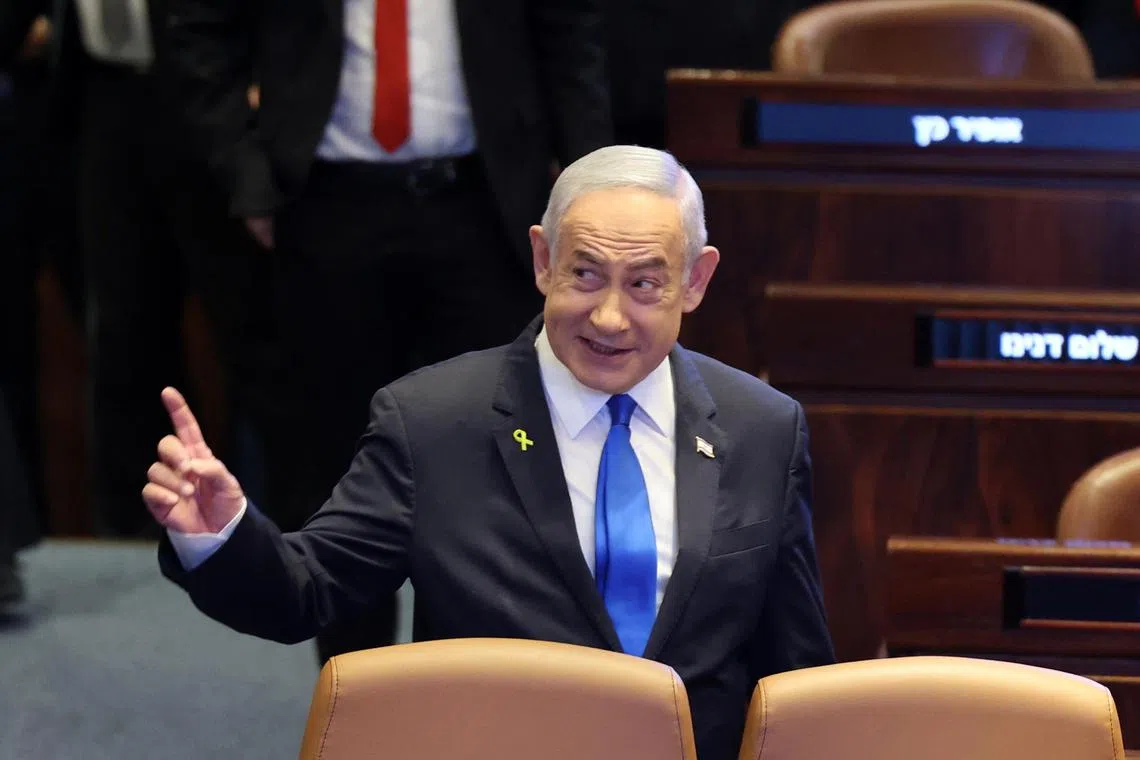Netanyahu vows to act with ‘force, determination’ against Yemen’s Houthis
Sign up now: Get ST's newsletters delivered to your inbox

Prime Minister Benjamin Netanyahu accused the Iran-backed Houthis in Yemen of threatening world shipping and the international order.
PHOTO: EPA-EFE
Follow topic:
JERUSALEM - Israeli Prime Minister Benjamin Netanyahu on Dec 22 vowed to retaliate against Yemen’s Houthi rebels after they fired a missile at Tel Aviv, warning that Israel would target what he described as the last remaining arm of “Iran’s axis of evil”.
The Houthis struck Israel’s commercial hub on Dec 21
“As we acted with force against the terrorist arms of Iran’s axis of evil, so we will act against the Houthis... with force, determination and sophistication,” Mr Netanyahu said in a video statement.
The strike on Tel Aviv was the second such attack on Israel by the Houthis in a week, and one of several since the war in Gaza broke out.
The Iranian-backed Houthis say they are acting in solidarity with Palestinians as the war between Israel and Hamas in Gaza rages on.
The war began on Oct 7, 2023, following Hamas’ deadly attack on Israel, which resulted in the deaths of 1,208 people. Militants also took 251 hostages, of whom 96 remain in Gaza, including 34 the Israeli military says are dead.
Israel’s retaliatory offensive in Gaza has killed at least 45,259 people, a majority of them civilians.
Mr Netanyahu’s latest comments came after the United States said it struck targets in Yemen’s rebel-held capital Sanaa on Dec 21, hours after the Houthis hit Tel Aviv.
Among the targets were a Houthi missile storage centre and a “command-and-control facility”, the US Central Command said in a statement.
US forces also shot down multiple Houthi drones and an anti-ship cruise missile over the Red Sea, it said.
However, two US Navy pilots were shot down over the Red Sea early on Dec 22 in “an apparent case of friendly fire”, the US military said.
The Houthis later claimed they had targeted the aircraft carrier USS Harry S. Truman a day earlier in an operation that led to “shooting down an F-18 aircraft”.
‘Not alone’ against the Houthis
US and British forces have repeatedly struck rebel targets in Yemen in response to Houthi attacks on shipping in the Red Sea and Gulf of Aden, which are vital to global trade.
Israel has also previously struck the Houthis in Yemen, including hitting ports and energy facilities, after rebel attacks against areas it claims as its territory.
The latest Israeli strike against the Houthis was on Dec 19, with Israeli warplanes striking Sanaa for the first time.
The Israeli response came soon after the rebels fired a missile that damaged an Israeli school.
On Dec 22, Mr Netanyahu acknowledged Washington’s backing, saying that Israel was “not alone” in its fight against the Houthis.
“The US, as well as other countries, see the Houthis as a threat not only to international shipping – but to the international order,” Mr Netanyahu said in his video statement.
In a similar statement issued earlier in the week, Mr Netanyahu said the Houthis would “pay a very heavy price” for their attacks on Israel.
“After Hamas, Hezbollah and the (Bashar al-)Assad regime in Syria, the Houthis are almost the last arm of Iran’s axis of evil,” he said.
“They are finding out, and will find out, the hard way that whoever harms Israel – will pay a very heavy price.”
As well as Hamas, Israel has fought Iran-backed groups across the region since the start of the war in Gaza, including the Houthis in Yemen and a full-blown war against Hezbollah in Lebanon.
Those campaigns have killed several leaders of Hamas and Hezbollah, including the mastermind of the Oct 7 attack, Hamas chief Yahya Sinwar, as well as Iranian commanders.
Israel also assassinated Hezbollah chief Hassan Nasrallah, while Sinwar’s predecessor Ismail Haniyeh was killed in a brazen attack in Tehran, which Iran and Hamas have blamed on Israel.
Israel further shocked Hezbollah with attacks involving exploding pagers and walkie-talkies that killed dozens of its fighters and wounded thousands.
In late November, Israel and Hezbollah agreed to a ceasefire, which has stopped the former’s blistering bombing campaign inside Lebanon, but Israeli troops are still operating in southern parts of the neighbouring country. AFP

